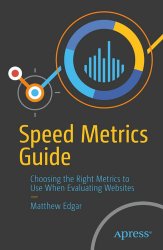Speed Metrics Guide: Choosing the Right Metrics to Use When Evaluating Websites
- Добавил: literator
- Дата: 20-02-2024, 16:41
- Комментариев: 0
 Название: Speed Metrics Guide: Choosing the Right Metrics to Use When Evaluating Websites
Название: Speed Metrics Guide: Choosing the Right Metrics to Use When Evaluating WebsitesАвтор: Matthew Edgar
Издательство: Apress
Год: 2024
Страниц: 246
Язык: английский
Формат: pdf
Размер: 10.1 MB
Faster websites offer a better user experience and typically have higher conversion rates. It can be challenging to know where to invest to meaningfully improve a website's speed. Investing correctly to improve speed starts with understanding how to correctly measure speed and knowing how to use those measurements to identify the biggest opportunities.
Speed Metrics Guide helps marketers, SEOs, business leaders, designers, and everybody else involved in website performance select the right metrics to use to optimize their website's speed. Each chapter examines a specific metric, discusses what it measures, why the metric matters and what tactics will help improve that metric.
The benefits of faster websites are well known. Faster websites offer a better user experience and typically have higher conversion rates. Faster websites may rank better in organic search results and are easier for robots to crawl. Because of these benefits, many companies invest heavily to improve their website’s speed.
Unfortunately, companies often invest in the wrong areas and do not meaningfully improve the website’s speed. Investing in the right areas and making a meaningful difference starts by understanding how to correctly measure a website’s speed and knowing how to use those measurements to identify the biggest opportunities.
Speed reports can be difficult to understand with so many metrics available. TTFB, FCP, LCP, TBT, or TTI might be slow, but what do these acronyms represent about website speed? The harder question to answer is what actions should be taken if a metric is slower than it ought to be? If multiple metrics are slower than they ought to be, which metric should be improved first to have the greatest impact? Answering these questions requires not only understanding what the metric represents but also understanding how each metric relates to the bigger picture of website loading.
This book explores the different speed metrics and explains how to use each metric to evaluate the different factors contributing to slower website speeds.
There is a metric to describe each stage of a website’s loading process. By using a combination of these metrics, it becomes clear which stage is slower and where investments ought to be made. This book starts at the beginning of the loading process, with metrics describing the initial connection to the website, and continues through to the end of the loading process, with metrics describing how quickly visitors can interact with the webpage.
What You'll Learn:
The best metrics and tools to help you measure website speed, including Google's Core Web Vitals
How and when to best use each metric
Where each metric fits within the website loading process
How to use each metric to find different ways of improving website speed
Who This book Is For:
Non-technical audience, including marketers, SEOs, designers, and UX professionals.
Скачать Speed Metrics Guide: Choosing the Right Metrics to Use When Evaluating Websites
Внимание
Уважаемый посетитель, Вы зашли на сайт как незарегистрированный пользователь.
Мы рекомендуем Вам зарегистрироваться либо войти на сайт под своим именем.
Уважаемый посетитель, Вы зашли на сайт как незарегистрированный пользователь.
Мы рекомендуем Вам зарегистрироваться либо войти на сайт под своим именем.
Информация
Посетители, находящиеся в группе Гости, не могут оставлять комментарии к данной публикации.
Посетители, находящиеся в группе Гости, не могут оставлять комментарии к данной публикации.
